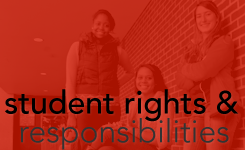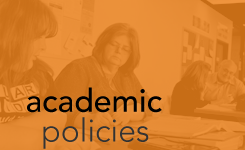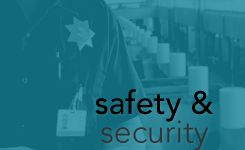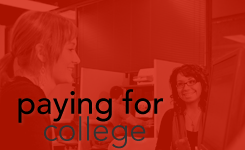Student Rights & Responsibilities
Sauk Valley Community College is committed to a philosophy that ensures the basic rights of students, such as freedom of speech, freedom of the press, the right to assemble, and the right of inquiry. In consideration of these rights, it is implicit that students should also accept those responsibilities that are inherent with attendance at a public community college. These include such basic responsibilities as:
- Respect for Public and Private Property
- Respect for the Rights and Privileges of Others
- Adherence to Recognized Standards of Scholarship
- Respect for Duly Constituted Authority
Students should recognize that the primary educational function of SVCC must be maintained at all times and that ultimate authority rests with the Board of Trustees as elected representatives of the College constituency. The Board also serves as the place of final appeal for grievances in any matter concerning the College provided the student shall have first exhausted all relevant procedures and appeals provided by College policy or procedure.
Sauk Valley Community College provides technology resources to meet the College's purpose of supporting our educational programming and the community. Access to technology resources including equipment and services (including internet access) is a privilege, not a right. Accepting access to this technology carries an associated expectation of responsible and acceptable use. The College's Acceptable Use Policy can be viewed at svcc.edu/aup.
Students should turn off all electronic devices while in the classroom unless they have the consent of the instructor. Electronic items include, but are not limited to cell phones, laptops, tablets, MP3 players, voice and video recorders. Students with legitimate reasons for using this equipment can do so only after receiving explicit consent of Disability Support Services. Class materials, including lecture and discussion notes, are considered property of SVCC. Students permitted to record classes for instructional or access purposes may not share, sell, distribute, or post the recording to the Internet to include all social media sites. Students violating this policy may face college disciplinary action. Also, students are subject to the SVCC Acceptable Use Policy: svcc.edu/aup.
Sauk Valley Community College shall utilize Affirmative Action as required by law. The College has adopted an Affirmative Action Plan. Copies of this document are available in the Human Resources Department. The Sauk Valley Community College Affirmative Action Plan contains a grievance procedure that any employee, employment applicant, student, or student applicant may obtain by contacting the Affirmative Action Officer, 815.835.6291 (3L20).
Discussion and expression of all views is permitted within Sauk Valley Community College subject only to requirements for the maintenance of order. Support of any cause by orderly means, which is not in violation of law and which does not disrupt the operation of Sauk Valley Community College, nor interfere with the rights of others, is permitted. Sauk Valley Community College retains the right to assure the safety of individuals, the protection of property, and the continuity of the educational process. For information on the procedure and process, contact the Dean of Student Services at 815.835.6305 (Student Services Center) or visit Assembly, Rally, or Demonstration Precedures.
The Code of Student Conduct has been established to control action going beyond the exercise of such rights, to maintain order, on campus and to guarantee the broadest range of freedom for all who come to learn at SVCC.
Each student is responsible for knowledge of and compliance with this Code of Student Conduct, which is available through Academic Advising, from the Dean of Student Services, and the Vice President of Academics and Student Services.
The College further recognizes each student's right to procedural due process, including notice, an opportunity to respond to the allegations, and an appeal process. Any student cited for violation of the Code of Student Conduct will:
- Receive notice of the alleged violation. The notice will include:
- the specific code violations; and
- reference to the process and rights of students as indicated in the Code of Student Conduct;
- Be provided an opportunity to respond to the charges;
- Be able to appeal the decision, if necessary;
- Not be permitted to withdraw from the College with a clear record until such charges have been resolved.
To review prescribed conduct, Dean of Student Services authority, procedures in cases involving possible discipline, disciplinary actions, temporary suspensions, and appeals refer to the Code of Student Conduct and Disciplinary Procedures in the college catalog and on the college website.
SVCC has established an informal and formal process for reporting a concern or addressing a complaint on campus. Refer to the SVCC catalog or college website for compliant procedures and resources.
Sauk Valley Community College is committed to providing and maintaining an environment for faculty, staff, and students that is drug free, healthy, safe, and secure. To this purpose, and in compliance with the Drug-Free Schools and Communities Act Amendments of 1989 (Public Law 101-226), the Drug Free Workplace Act of 1988 (Public Law 100-690) and the Illinois Drug Free Workplace Act of 1986 (PA 86-1459) the following procedures exist to prevent the unlawful use of controlled substances and abuse of alcohol by students and employees.
Standards of Conduct
SVCC prohibits the unlawful possession, distribution, dispensing, manufacture, possession, or use of illicit controlled substances and alcohol by students, employees, and visitors on its owned and controlled properties, at college-sponsored activities, and in college vehicles.
Penalties for Violation of Policy
Students who violate this policy will be governed by the Colleges Student Code of Conduct and subject to disciplinary action. For students, this action may include suspension, expulsion, and/or other corrective actions aimed at rehabilitation. For employees who violate this policy, sanctions may include personnel action up to termination or a requirement that the employee satisfactorily participate in a drug abuse assistance or rehabilitation program, as consistent with law and Board policy. Visitors determined to have violated this policy are subject to removal from College premises and may also be subject to legal action.
Legal Sanctions for Unlawful Possession, Use or Distribution of Elicit Drugs and Alcohol
Federal, state, and local laws determine legal sanctions for the unlawful possession, use, distribution, dispensing and manufacture of elicit drugs and alcohol. Those laws provide legal sanctions that include, but are not limited to, incarceration and large monetary fines.
Health Risks
Various serious short-term and long-term health risks are associated with the use of illicit drugs and the abuse of alcohol. For complete information, please consult a healthcare professional, local library, or the website of the National Institute of Drug Misuse at https://drugabuse.gov/related-topics/health-consequences-drug-misuse
State and Federal Law Misalignment
The Illinois Cannabis Regulation and Tax Ext (410 ILCS 705/) became effective January 1, 2020. With the implementation of The Illinois Cannabis Regulation and Tax Act, the state Illinois decriminalized the possession and use of cannabis under certain specific circumstances. Despite changes in state laws, Sauk Valley Community College remains cannabis free. Possessing, selling, or using cannabis in any form at any SVCC location or event or in college vehicles is not permitted. SVCC receives federal funding and therefor abides by federal regulations.
Information, Counseling, Treatment & Rehabilitation
SVCC recognizes violations of its drug and alcohol policy as serious breaches of the College's standards and policies. The College also recognizes drug and alcohol dependence as illnesses. When students, faculty, or staff members are misusing drugs or abusing alcohol, they are encouraged to seek assistance through a substance abuse assistance program and/or a rehabilitation program. Students may visit svcc.edu/counseling to complete a campus counseling referral form or email counseling@svcc.edu.
Local Drug & Alcohol Treatment Programs not affiliated with SVCC:
Sinnissippi Centers:
Sterling, Dixon, Oregon, Mount Carroll, & Rochelle
815.284.6611
Lutheran Social Services of Illinois:
1901 1st Ave, Sterling, IL 61081
815.626.7333
Safe Passage Opiate Addiction Program:
Dixon Police & Lee County Sheriff's Department
(815) 288-6631
Whiteside County Health Department:
1300 W. 2nd Street, Rock Falls, IL 61071
815.626.2230
Private Practitioners: Refer to local yellow pages
For more information, visit svcc.edu/drugfree.
The term ‘hazing’, for purposes of reporting statistics on hazing incidents…means any intentional, knowing, or reckless act committed by a person (whether individually or in concert with other persons) against another person or persons regardless of the willingness of such other person or persons to participate, that:
is committed in the course of an initiation into, an affiliation with, or the maintenance of membership in, a student organization; and
causes or creates a risk, above the reasonable risk encountered in the course of participation in the institution of higher education or the organization (such as the physical preparation necessary for participation in an athletic team), of physical or psychological injury including:
- whipping, beating, striking, electronic shocking, placing of a harmful substance on someone’s body, or similar activity;
- causing, coercing, or otherwise inducing sleep deprivation, exposure to the elements, confinement in a small space, extreme calisthenics, or other similar activity;
- causing, coercing, or otherwise inducing another person to consume food, liquid, alcohol, drugs, or other substances;
- causing, coercing, or otherwise inducing another person to perform sexual acts; any activity that places another person in reasonable fear of bodily harm through the use of threatening words or conduct;
- any activity against another person that includes a criminal violation of local, State, Tribal, or Federal law; and
- any activity that induces, causes, or requires another person to perform a duty or task that involves a criminal violation of local, State, Tribal, or Federal law.
In accordance with the Illinois Smoke-Free Campus Act, effective July 1, 2015, smoking is prohibited everywhere on campus, including both outdoors and indoors. "Smoking" is defined as (1) lighting or burning any type of matter or substance that contains tobacco, including but not limited to cigarettes, cigars, cigarillos, pipes, water pipes, or other smoking devices (2) lighting or burning of non-tobacco plants or marijuana; and (3) using electronic cigarettes. Also includes smokeless tobacco.
This policy applies to any individual on campus property, including but not limited to students, faculty, staff, other employees, contractors, subcontractors, volunteers, visitors and members of the public. The smoking prohibition also applies to all college-owned vehicles at all times.
Sauk Valley Community College is committed to fostering a safe, productive learning environment and does not discriminate on the basis of sex in any of it's educational programs or activities. Title IX and College Policy prohibits discrimination on the basis of gender or sex. Sexual misconduct including sex based harassment, domestic and dating violence, sexual assault, exploitation, and stalking are prohibited acts. All forms of sexual misconduct or other identified acts of prohibited conduct under the College's policy is regarded as serious, and violations can result in discipline, including possibility of separation from the College. A respondent, the party who is alleged to have engaged in the harming behavior, is presumed not responsible for a policy violation prior to a finding of such though the College's formal resolution process.
SVCC encourages anyone experiencing sex-based harassment or discrimination or other prohibited conduct as defined in the College's Policy to talk to someone about what happened, so support/resources can be provided and the College can also respond appropriately. A student wishing to speak confidentially about an incident, should contact one of the campus confidential resources in Counseling and Disability Support Services (DSS).
A student wishing to report an incident or having questions about College policies and procedures regarding Title IX, should contact the College's Title IX Coordinator. Students can also report an incident using the Title IX Reporter form at www.svcc.edu/titleix. A report may be made at any time, day or night; however, the Title IX Coordinator will respond during normal business operating hours to reports. Any one requiring immediate assistance should call 911.
A copy of the College's Sexual Misconduct procedures (Title IX, Sexual Harassment) is on the SVCC website under Policies or at svcc.edu/sexual-misconduct.
SVCC provides all students the opportunity to authorize the College to disclose certain private mental health information to a person designated by the student. For more information and to access a student authorization form, contact Admissions & Records or refer to svcc.edu/optional-disclosure.






